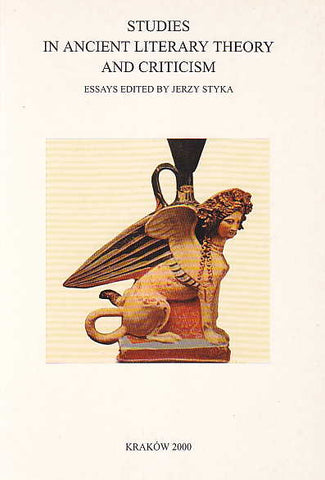Studies in Ancient Literary Theory and Criticism. Essays edited by Jerzy Styka
15,99 $
ISBN: 83-7188-370-6
Description: 370 pages
Condition: very good
Weight: 455g.
Studies in Ancient Literary Theory and Criticism. Essays edited by Jerzy Styka, Classica Cracoviensia V, Cracow 2000
The fifth volume of Classica Cracoviensia is devoted in its entirety to the ancient literary theory and criticism. The articles in this volume were presented at the International Conference on Ancient Literary Theory and Criticism organised by the Institute of Classical Philology of the Jagicellonian University, in co-operation with our academic partners abroad, and held in Cracow in October 1999 under the patronage of His Magnificence the Rector of the Jagiellonian University, Professor Franciszek Ziejka, as part of the cycle of events to celebrate the Sixth Centenary Jubilee of the Renewal of the University of Cracow by Queen Jadwiga of Anjou and her consort King Vladislaus Jagiello in 1400.
The papers in this volume of Classica Cracoviensia cover a wide range of subjects from the field of ancient poetics, rhetoric, and literary criticism. It opens with the essay by Alain Michel on the development of the concept of beauty in European literary culture, from Antiquity to the present times. Part One of the volume (Pars Graeca), contains a series of contributions concerning the theoretical issues of Greek poetry, artis?tic prose, and literary critricism from Homer to Heliodorus. They include the epic style, the development of concepts of the lyrical genres, Greek tragedy and comedy, mime, the rhetorical style, the emergence of new genres of artistic prose, the Greek romances, and the theory of aesthetic reception of literary works. Part Two (Pars Latina) presents papers on particular aspects of Latin literature, such as the language of comedy, the Roman theory of style, the development of Roman satire, and literary criticism in the wide sense of the term. Part Three (Varia) brings an interesting complement and conclusion to the volume...
Introduction
Alain MICHEL, Les theories litteraires et la beaute
I. Pars Graeca
Robert ZABOROWSKI, Sur la methods descriptive des sentiments d'Homere
Stanislaw STABRYLA. The Notion of the Lyric as a Literary Genre in the Greek Theory
Maarit KAIMIO, Tragic Titles in Comic Disguises
Thomas PAULSEN, Tragodienkritik in den "Froschen" des Aristophanes
Romuald TURASIEWICZ, Style in the Speeches of Lysias
Jakub Z. LICHANSKI. Viertes yivoc, der Rhetorik. Rufusvon Perinth und yivoq iffTopiKov
Sylwester DWORACKI, The Aethiopica of Heliodorus Against the Background of Literary Tradition
Kazimierz KORUS, Alle origini del mimo letterario greco
Krystyna BARTOL, Measure of Pleasure. Conception of Artistic Delight in Philodemus' and Pseudo-Plutarch's Treatise;; on Music
Jacques BOULOGNE, La poetique de Plutarque: Une esthetique dufondu
II. Pars Latina
Ewa SKWARA, Plautus' Puns and Their Translation
Jozef KORPANTY, Anagrams and Two Other Related Sound Repetitions
Jerzy STYKA, Formen des Gattungswandels in der romischen Satire: Lucilius, Horaz
Hartwig HECKEL, A Genius on Genius. Ovid, Orpheus, Arachne
Alfons WEISCHE, Ausdrucksfiille in stilistisclier Theorie und Praxis hei Seneca Rhetor
Paolo MANTOVANELLI, Perche Ovidio non si poteva fermare (Sen. Rhet. Contr. 9, 5, 17)
Ulrich HAMM. Illitteratum plausum nee desidero. Phaedrus uber sich alsDichter
Sabine GREBE, Quintilian, Institutio oratoria 10,1. Beobachtungen Zur Literaturkritik
Bernd HESSEN, Narrate, pitellae Pierides! Zur Poetologie Juvenals
Elzbieta WESOLOWSKA, Pronto's Rhetorical Jokes or Much Ado About Nothing
III. Varia
Albert GORZKOWSKI, The Difficulties with Polish Rhetoric
Terminology in Connection with Translating ofH. Lausberg's "Handbuch der literarischen Rhetorik"
Lidia SUDYKA, Concepts of Style in Indian Poetics










